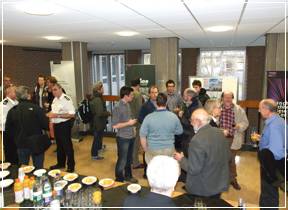News & events
Wildfire and wine; launch of the Knowledge for Wildfire NERC KE Fellowship project
Thewildfire@manchester seminars got off to a good start on Wednesday 27 February when 40 or so academic staff, students and stakeholders from the Fire Service, moorland managers and water companies packed into the Hanson room to hear Matt Davies from Glasgow University present early results of the Natural Environment Research Council (NERC) Urgency grant on ‘Wildfire severity and moorland carbon budgets’. The seminar was hosted jointly by Geography Research Seminars and Julia McMorrow’s Knowledge for Wildfire’s (KfWf) Knowledge Exchange (KE) Fellowship project, also funded by NERC.
Matt and co-researcher Alan Gray from the Centre for Ecology and Hydrology have adapted a method called the composite burn index (CBI), originally designed for North American forests, to estimate the severity of UK moorland wildfires which burn into carbon stored in underlying peat. The six wildfires chosen – three in Northwest England and three in Scotland – all occurred in the dry springs of 2011 and 2012. Fire severity refers to the immediate impact on soil and vegetation. Together with fire intensity (a physical property which we rarely know for most UK fires), it helps to explain longer-term ecosystem response, such as the type and rate of regrowth, and from this, longer-term carbon budget. The researchers used the CBI method to estimate the amount of fuel consumed by the fire above and below ground, and monitored carbon lost from the soil in the form of the greenhouse gases, methane and carbon dioxide.
CBI was shown to vary at least two-fold between fires and up to three-fold within a fire. The take-home message is that fire severity is very variable within and between fires, so a large number of sampling sites are needed to reliably estimate carbon loss from peatland wildfires. Many factors must be taken into account in designing a sampling scheme, including fire history, fuel conditions (load, type, continuity, moisture content, etc), topography and how the fire was fought. Stakeholders can help by contributing essential on-the-ground knowledge. A system for rapidly notifying researchers of fires would also allow severity to be recorded immediately after the fire, before vegetation begins to grow back. For further information, contact Matt at .
After the seminar, Julia McMorrow gave an introduction to her Knowledge for Wildfire KE Fellowship Project and website. The project runs for two years until September 2014. This was followed by an informal wine reception to celebrate its launch. Professor Martin Evans gave a short welcome on behalf of Geography as project hosts, and Simon Thorp, Vice Chair of the England and Wales Wildfire Forum, Director of the Heather Trust and KfWf steering group member explained the need for the project from a stakeholder’s perspective.

Reception to launch Knowledge for Wildfire NERC Knowledge Exchange project.

Left to right: two of the Knowledge for Wildfire steering group members, Jonathan Aylen (Manchester Business School) and Simon Thorp (The Heather Trust, Vice-Chair of England and Wales Wildfire Forum); seminar speaker, Matt Davies (Glasgow University); and project staff from Geography, Jo Tantanasi (project assistant) and Julia McMorrow (NERC KE Fellow).
